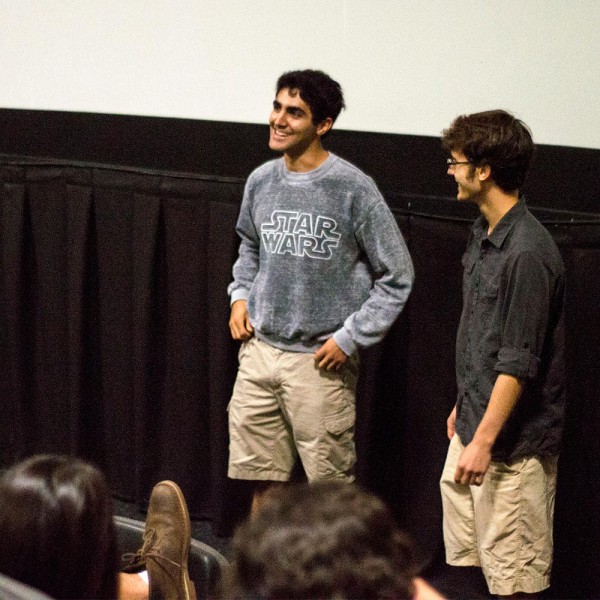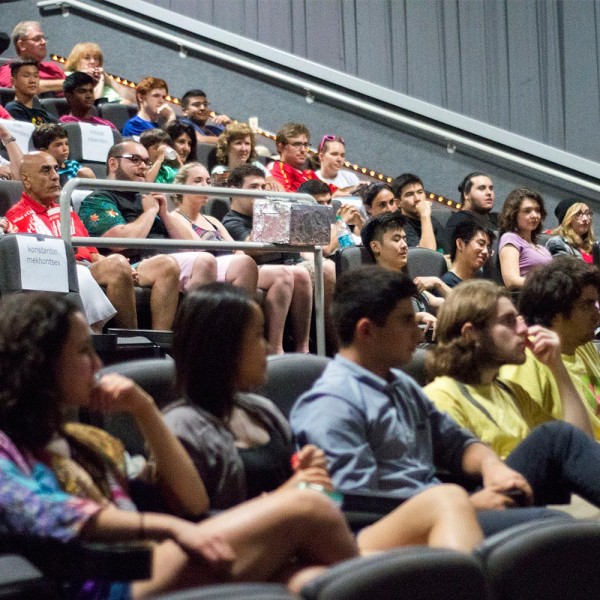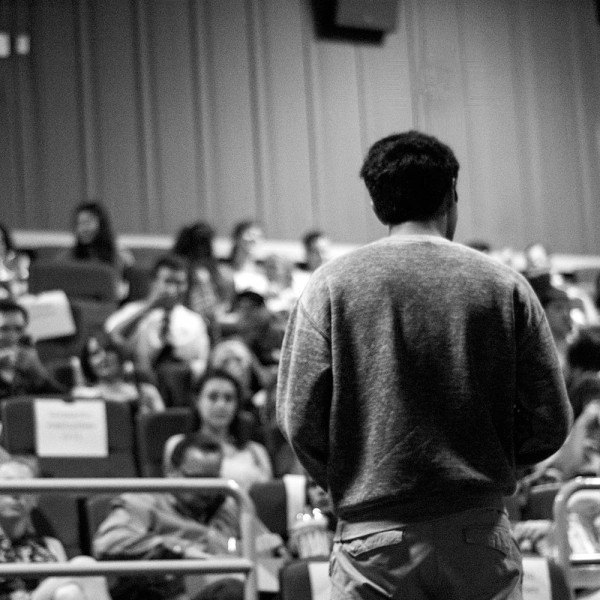With the Release of his First Independent Film,
my Younger Brother Solidified his Place
as a Filmmaker in an Unexpected Way
Growing up, my younger brother was unlike most of his peers – he stayed in to watch, read about, and think about films while everyone else went out and did whatever it is that young boys do. As a result, his interpersonal communicating took a backseat to his introverted pondering. Everyone assumed my brother was quiet because he just didn’t have much to say. It wasn’t until we attended the premiere of his first independent film that we realized how wrong we all were.
My Brother’s Beginnings
I was about six years and nine months-old when my brother, Arshum Rouhanian, was born in June of 1996. My parents are immigrants from Iran who came to the U.S during the revolution in 1979. With humble beginnings, my immediate family lived with many other family members under one roof and, so, my brother was constantly receiving attention from someone. Yet, he didn’t revel in the attention. Instead, he progressively withdrew more and more into himself to the point where it would be a pleasant surprise if Arshum spoke to any of us unprompted.
This left Arshum alone on many days after school and on weekends, where he would immerse himself into films. Not just watching films, but reading about their production, researching their musical score, analyzing various interpretations, drawing sketches of film ideas, creating first drafts of screenplays, and so on. It didn’t take long for my brother to know he wanted to devote his life to film. For his 14th birthday, he asked for (and received) a camera.
From then on, to call what he felt for film a “passion” would be a severe understatement. Soon, he started a YouTube channel where he uploaded some of his first productions including, short films, school video projects, and, eventually, a video that reached over 2 million views.

A screenshot of Arshum’s short PSA film about drunk driving that he directed and produced on behalf of his high school’s Student Government Association.
Production of the Film
The summer before his senior year of high school, Arshum began a job where he had to film promotional videos of classic cars for a local auto retailer. After two years of this type of work, he finally had saved-up enough money to completely self-fund his first feature film production. Arshum had already started developing the idea for the film during his first semester of college – a time where many people, including Arshum, feel vulnerable, afraid, and nostalgic. These emotions would be three prominent themes throughout the film, which Arshum titled: A Day with God.
In early 2015, Arshum messaged Konstantin Mekhonstev, someone whose photography Arshum held great respect for. He asked Konstantin to be his cinematographer and co-editor for the film and as Konstantin later revealed during the opening night of the film, he had “no idea what [he] was getting himself into when [he] said yes.” Yet, by the end of the seven months that filming and editing took on A Day with God, Konstantin’s hard work and amazing talent was evident in the film and the friendship and respect that had grown between Konstantin and Arshum was also evident through their admirable rapport.

Arshum and his cinematographer/co-editor Konstanin Mekhonstev answer questions about the film and its production process.
I hardly saw my brother during the seven months that the entire production process took. Once he officially recruited Konstantin’s help, Arshum did not stop for one second – from selecting actors to selecting filming locations, every decision he made was carefully calculated. He filmed during the day and edited all night. He forewent a prestigious internship, social outings, and even his job. But in the process, he gained something he’d lacked for much of his life: confidence.
Once he’d been timid, yet Arshum had grown to become someone who wasn’t afraid to ask his actors to do 15 takes of a scene if he didn’t feel as though it was just right. He was a leader during this production; the film was something he felt strongly about and sacrificed a lot for and he wasn’t going to let his shyness keep him from making his vision come to life. This film gave him the push and the conviction, mostly out of necessity, that neither my parents nor I could ever give him. If he wanted his actors to express a certain emotion, he had to be self-assured enough to open up about the character and his feelings. This was especially hard for Arshum since he had based the protagonist on himself in many ways. Alas, he had no choice – to talk about the character’s emotions and experiences meant to talk about his own emotions and experiences. And he did exactly that.
The result? A film with a raw character analysis that tackles tough subjects like suicide, drugs, and depression.
About A Day with God
A Day with God is about Gabe, a somewhat pretentious young adult who believes that because he sees all the things wrong the world, he is above everyone else. Yet, at the same time, it’s obvious that Gabe wishes he could un-see this harsh reality, which coincides with the process of turning into an adult. Thereby, the theme of nostalgia emerges. Gabe longs for the days of his childhood where everything was much brighter – where he didn’t understand the significance of all his mother’s broken relationships, where socializing didn’t seem so superficial, where books like Atlas Shrugged didn’t resonate so strongly. This dichotomy of hating what his life is and hopelessly wanting to return to the ignorant bliss of childhood highlights another major theme: vulnerability. Gabe spends his days smoking and eating pizza until one day Mary comes into his life. To him, Mary symbolizes an adult who was too afraid to ever actually grow-up and face what life really is. He is frustrated by her optimism and what he sees as misplaced relentless faith in God. The film focuses on the clashing relationship between Gabe and Mary and the courage it takes to expose your vulnerability and be transparent enough to ask for help – the third and most important theme.
The Premiere
When the movie premiered on July 29th, 2015, Arshum and his co-editor Konstantin had just finished all the editing only two nights before. He had sent a Facebook invitation out for the premiere a few weeks beforehand, but the night before the premier, he admitted to me his fear of no one showing up. His fear went unfounded. The day of his premiere, there was not a single empty seat in the 150-seat movie theater. Family members, friends, and strangers filled the auditorium and my once timid brother was now front and center.

The auditorium of the movie theater quickly starts to fill-up. Eventually, there was not a single empty seat.
My mouth was agape watching my brother, in front of this crowded theater, speak confidently throughout his introduction to the film. He was eloquent and assertive as he spoke about the film, his inspiration, his gratitude and admiration towards Konstantin. And he stood strong and answered everyone’s unpredictable questions during a Q&A after the film.
I’d be lying if I said I wasn’t a bit nervous for Arshum during the time of questions. This emotional and dramatic film clearly came from somewhere personal, so of course he was going to be asked personal questions. But when asked those questions, Arshum handled them like a professional. He told me later that he wanted to stay true to the film’s theme of transparency and he would be a hypocrite to his own film if he refused to expose himself and his feelings. So when asked where he drew his inspiration from, Arshum talked about how he has struggled to open up about himself, even to family and friends. He said he realized he wasn’t the only one who faced this struggle when he noticed that “people [would] tweet a personal thought at 2AM and then delete it the next morning.” He went on to say,
“It’s like, they have an inner desire to express themselves openly, but they are too scared to let people actually see these thoughts. I think it’s just therapeutic for most people. Seeing that pushed me to expose myself with this film and hopefully show others that they can do it too.”
When asked if he was nervous to show the film, he said he was until he realized that “nothing can stop me from doing what I love except me. My fear of being judged and rejected was keeping me from making a meaningful film. I knew I had to get over that barrier and the only person who could decide when I was ready to do that was me. So I did it.”
Closing Thoughts
I am incredibly proud of my younger brother. I am in awe of his dedication, talent, hard work, and the courage it took to face the challenges he needed to in order to make this film happen. The nearly seven-year age gap between Arshum and I has allowed me the privilege of watching him grow up. My love for him sometimes made me fear what the world would do to a quiet boy with a kind heart. But now, I rest assured – I know now that his kindness is not weakness and his quietness, though sometimes still there, is not a reflection of his ability to express himself. If he wants the world to hear him, he has the vehicle of film to help him achieve that.
Despite putting all his savings into this film, including paying thousands to have our local movie theater show the film on one of their screens, Arshum did not charge an admission fee to any of his 150 viewers. He only had one goal: to be heard.
Arshum, we hear you loud and clear and we can’t wait to hear even more from you.
When I heard about Arshum’s story through his sister, Anoosha, it literally took my breath away. MicroFilmmaker was created to help inspire and encourage the storytellers of a generation, with an emphasis on those whose normal voices might be quieter than those around them. Our heart has always been to empower those that the world overlooks, because their stories often are the most crucial, the most special, and the most capable of changing the world.
For such a personal filmmaker and such a personally touching story, I wanted a writer who could truly do it justice, which is why I requested that Anoosha write the article for us! My thanks to Anoosha for her hard work and dedication in this endeavor and our encouragement to Arshum to keep on the path he’s on, telling the stories that burden his heart and mind. May this article be an inspiration to any of you whose heart is to make films, but you need the encouragement to believe you can do it too!
If you’d like to see the film that Arshum created, I’ve embedded it below.
–Jeremy T. Hanke


